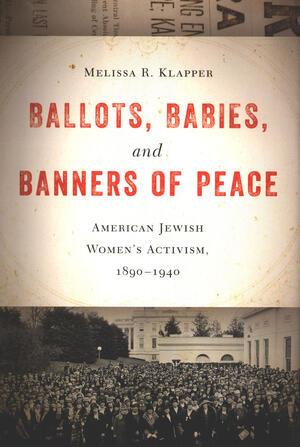Ballots, Babies, and Banners of Peace
Historian Melissa Klapper calls her new book, Ballots, Babies, and Banners of Peace “a project of documentation and restoration.” As you might expect from a member of JWA’s Academic Advisory Council, she sees her study of American Jewish women’s activism in the period 1890-1940 as filling in what has been left out of both Jewish and women’s history.
On the one hand, she laments the “general absence of Jewish women from narratives of American women’s history” and argues that accounts of social movements “are incomplete because they have failed to analyze the impact of Jewish women’s presence.” Scholars have “virtually ignored” a significant number of Jewish women who chose “to focus their energies on the great women’s social movements of the first part of the twentieth century—suffrage, birth control, and peace.” Historians of American women “rarely acknowledge the presence of Jewish women in social movements they assume to have been either Christian or secular in nature.”
On the other hand, Klapper writes, “the history of American Jews is incomplete without considering the importance of women’s activism in shaping the American Jewish community” in the first half of the 20th century. Scholars of American Judaism still tend to discount the role of women in the public sphere.
It was just this state of affairs that led to the creation of the Jewish Women’s Archive, which was founded in large part because scholars and documenters of American Jewish history paid little or no attention to women, and scholars and documenters of American women’s history paid little or no attention to Jews. Klapper’s work on the Jewish women who organized and helped fund the fight for suffrage, established birth control clinics in immigrant neighborhoods, and played a key role in the international peace movement is an example of the kind of careful scholarship that is needed to correct the imbalances in both Jewish and women’s history.
One of the fun things for me about reading Ballots, Babies, and Banners of Peace was encountering women I know from jwa.org. Two whose stories are told in depth in our “Women of Valor” section play important roles in Klapper’s book: Hannah Greenebaum Solomon, and Gertrude Weil. At Solomon’s funeral in 1942, one of the many Jewish women she inspired declared, “She taught us that we, as Jewish women, must know our heroic past and our great traditions, in order that we might better serve ourselves, our own people, and our country.” What a JWA Board member she would have made!!
Here are a few other American Jewish women active in the suffrage, birth control, and peace movements whom you will find in our online Encyclopedia. If you want to know even more, read Klapper’s fine book.







As someone who has done a lot of research on the suffrage movement, I was always pleased to come across a Jewish suffragist. This sounds like a wonderful book.